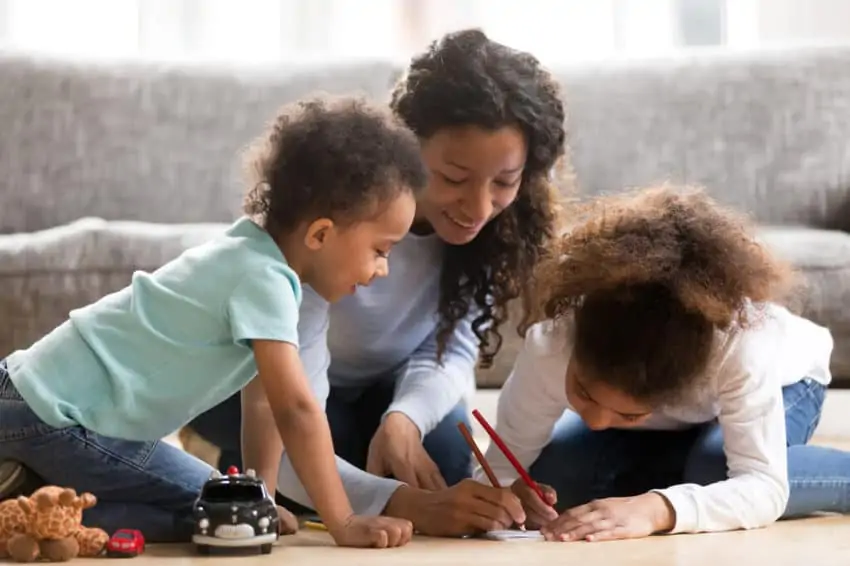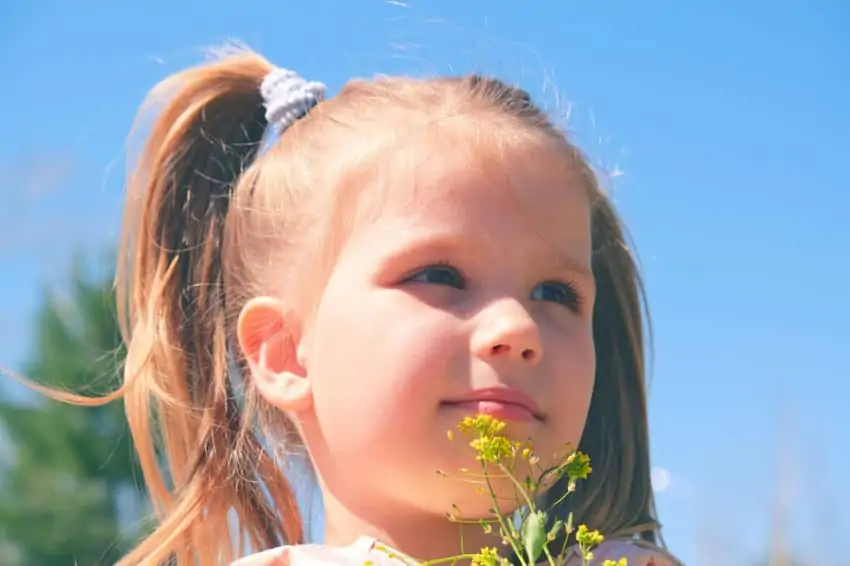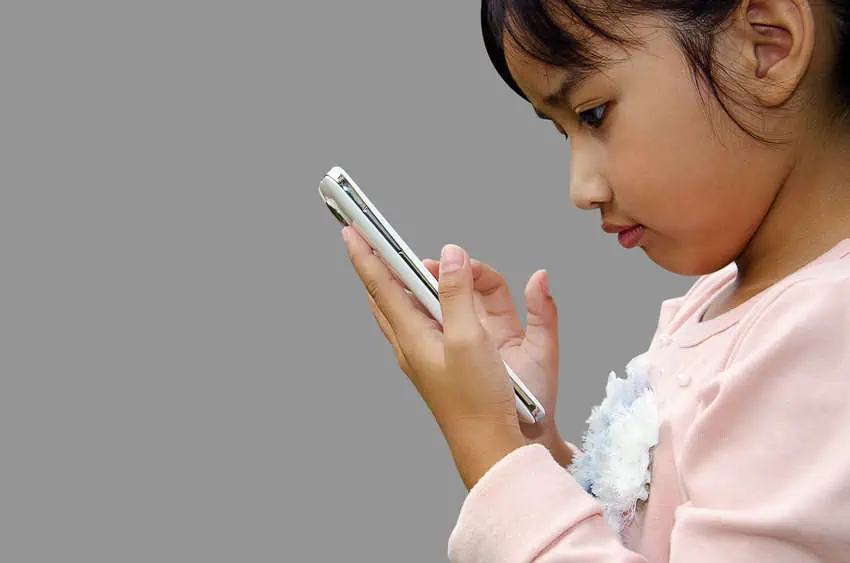The world would be a better place if we were all as kind as our children. Inherently good, it only takes a little bit of encouragement to teach kids to be kind. Whether you’re looking for random acts of kindness for kids or for ideas on how to intentionally raise your child to be kind, you’ve come to the right place. Let the next generation be even more kind than the last!

Instilling Kindness In Children
Kids have a heart of gold. Children are already inclined to be helpful and act unselfishly. From saving the ladybug on the sidewalk to sharing their toys with their friends, kids naturally have caring hearts. This carefree spirit we see in children is the root of our gratitude for life development.
Our goal as parents is to try and ensure we nurture what is already there and don’t diminish this natural kindness as they become older.
One study surveyed kids from grades 4-8 to try and understand how children view kindness. Unfortunately, it showed that kids believe their school to be less kind as they get older and transition from childhood to adolescence. We need to preserve that kindness!
33% of the kids interpreted kindness as helping others, while 34% saw it as being respectful, and 11% saw it as being an advocate. The same study surveyed children aged 6-8, and they described kindness as helping people physically and emotionally and sharing with others. This confirms that even from a young age, kids can identify empathy in their life and have a good grasp of how to do it themselves.
Kindness in children is more than just promoting a caring heart.
Another research study suggests that creating a kind and positive environment helps to foster academic success. If kids feel supported by teachers and other students, they are far more likely to do better. This is especially true if they face adversity that may prevent them from finding success otherwise.
A little bit of kindness can go a long way!
Intentional Ways To Raise Kids To Be Kind
If you want to cover all of your bases and be intentional when it comes to instilling kindness in your kids, here are a few tips on how to do just that…
Generosity
In life, time is everything. The more time we have on our hands, the more fun can be had.
Teaching the value of time to a child will make them understand how much it means to give that time to someone else. Dedicating a part of your day to your community or someone else is one of the highest forms of generosity you can do, and it doesn’t cost a dime.
Foster generosity by volunteering, donating, and helping others without being asked!
Show Praise
Another huge part of kindness comes from recognizing the good in others. Whenever you see your child performing an act of kindness, point it out to them and praise their efforts. Encouraging random acts of kindness for kids will ensure they happen more frequently.
You also want to praise them in general, teaching them that recognizing positive things in others is a nice thing to do. Compliment their drawing, how funny their joke was, and how lovely it is to see them smile. The more specific, the better!
Ask For Help
Kids may not understand that you need help unless you ask for it. Eventually, they will catch on and begin to offer and help out on their own.
Start by getting them to help out around the house. Chores can be minor, such as fetching the broom or setting the table. Even if these tasks aren’t that helpful and you could complete them faster, getting them to help around the house is a good place to start encouraging acts of kindness for kids.
Teach Emotions
Recognizing emotions will help to define kindness for your child.
What is that feeling when someone is unkind to you?
What is the feeling you get when you’re kind to someone else?
Help to label emotions and lead them through it! Ask how they’re feeling or identify it for them if need be. Describe what this feeling is and talk about it. You can also label your emotions in certain situations and tell them about it to try and understand how their actions affect others.
Teach Self-Love
Kindness so often is focused on helping others and how we treat people in our lives. But, what about how kind we are to ourselves? Self-love is something all kids need to be reminded of. After all, if we can’t be kind to even ourselves, how can we expect to truly understand how much kindness helps others?
Everyone Makes Mistakes
One concern about teaching kindness is creating the illusion of perfection. Kids need to understand that everyone is human and will make mistakes in their lives. There will be moments of regret at not doing something you maybe should have or lapses in judgment.
Ensure they don’t get too hard on themselves when they make mistakes and aren’t a picture-perfect citizen.
Teach Forgiveness
It is similar to understanding that you can make mistakes, so can others, and it is okay to show forgiveness. When someone makes a mistake, try to be compassionate and see the bigger picture. You can also maintain this thinking when it comes to your child.
Be gentle whenever they do something wrong and don’t let it get to you. See everything as an opportunity to teach a lesson, small or big.
Avoid Rewards
Some parents may feel inclined to reward their children for kindness with things, such as playing video games after volunteering or earning a sticker for completing a chore.
In reality, you don’t need these rewards. That blissful feeling that happens after you make someone else feel good should be more than enough. You can see their gratitude and will want to show kindness again just to get that feeling again!
25 Random Acts Of Kindness For Kids
When trying to encourage kindness in children, sit down together and plan out some random acts of kindness. Start by asking who in their life could use some kindness? This can be a stranger, a teacher, a classmate, a family member, a mailman, etc.
Then, ask them what they can do to show their appreciation for them. Letting your child develop their own actions will also tell you what they believe kindness to be.
Next, see what you need to do in order to complete this act of kindness. Will it require time and effort, or do you need materials to get started?
Here are some acts of kindness for kids as inspiration:
- Share your school supplies with a classmate.
- Give a teacher an apple (or a modern thank you gift).
- Help bake cookies to give away to someone else.
- Donate a book to your local library.
- Tell your friend something you like about them.
- Help put away items in the house.
- Give a bee some sugar water.
- Make someone a thank you card.
- Paint someone a picture.
- Bring an extra juice box for a friend.
- Help a family member or friend walk their dog.
- Water a plant.
- Pick up litter (with gloves and a parent).
- Hold the door open for a stranger.
- Thank the bus driver.
- Give someone a compliment.
- Give someone a hug when they’re feeling blue.
- Talk to a new friend.
- Volunteer at a local organization.
- Rake someone’s leaves or shovel the walk.
- Read a book to a younger sibling.
- Let someone else go first.
- Recycle your cans and juice boxes.
- Donate old toys.
- Call a loved one out of the blue.
The Takeaway
In order to raise children to be kind, you need to practice what you preach. Studies show that kids in grades K-3 see their teacher’s teaching and helping their peers as a major act of kindness. This shows how kids are highly observant of kindness, even if it’s not directed at them.
But, we already knew that right!?
Kids become a little mini-me of their parents, mimicking their behavior even if they don’t realize it. Every person at some point realizes they are just like their parent in some kind of way!
To be kind, practice the philosophy and methods mentioned above. Be kind to others, show respect, and welcome everyone from all walks of life. You can also point out others’ kind behavior to your child and describe why it’s crucial. For example, you can see someone drop off groceries into a food bank donation bin and explain to your child how it helps to feed those who can’t afford their own groceries. Your kid may suggest making your own donation!
Your child will pick up on things you may not even think twice about. Make sure you show that everyone deserves your kindness. This includes the server at the restaurant, your mother-in-law, your best friend, etc.
Teaching the importance of being kind to everyone you meet is a daily lesson.
More Resources on Teaching Kindness
- 35 Random Acts of Kindness Calendar (Free Printable)
- Sibling Kindness Calendar: Activities to Help Siblings Get Along
- Raising Altruistic Kids – Creating Kindness Bags
- 20 Simple Acts of Kindness: Teaching Kids To Be Kind with Little Gestures
Want even more?
Shop All Parenting Resources
Shop all of our parenting resources from self-regulation tools and managing big emotions to building self esteem and confidence. There are resources for all seasons of life!







